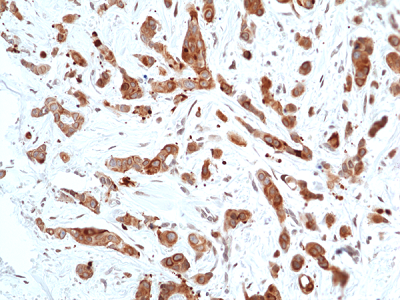anti-Phospho-GSK-3beta (Ser9) Rabbit Monoclonal (RM453)
| Code | Size | Price |
|---|
| REV-31-1345-00-R100 | 100 ul | £455.00 |
Quantity:
Prices exclude any Taxes / VAT
Overview
Host Type: Rabbit
Antibody Isotype: Rabbit IgG
Antibody Clonality: Recombinant Antibody
Antibody Clone: RM453
Regulatory Status: RUO
Target Species: Human
Applications:
- Immunohistochemistry (IHC)
- Western Blot (WB)
Shipping:
BLUE ICE
Storage:
Long Term: -20°C
Images
Documents
Further Information
Alternate Names/Synonyms:
Glycogen Synthase Kinase-3 beta
Concentration:
N/A
EClass:
32160000
Form (Short):
liquid
Formulation:
Liquid. 50% Glycerol/PBS with 1% BSA and 0.09% sodium azide.
Handling Advice:
Avoid freeze/thaw cycles.
Immunogen:
A phospho-peptide corresponding to human Phospho-GSK-3beta (Ser9).
Long Description:
Recombinant Antibody. This antibody reacts to human GSK-3beta only when phosphorylated at Ser9. There is no cross-reactivity to GSK-3beta that is not phosphorylated. This antibody may also react to mouse or rat Phospho- GSK-3beta (Ser9) as predicted by immunogen homology. Applications: IHC, WB. Clone: RM453. Isotype: Rabbit IgG. Formulation: Liquid. 50% Glycerol/PBS with 1% BSA and 0.09% sodium azide. Glycogen synthase kinase-3 (GSK3) is a protein kinase that was originally identified as a regulator of glycogen synthase, a key enzyme in glycogen metabolism. Since then, it has been shown to be involved in the regulation of a diverse array of cellular functions, including protein synthesis, cell proliferation, cell differentiation, microtubule assembly/disassembly and apoptosis. GSK3's substrate specificity is unique in that phosphorylation of the substrate only occurs if a phosphoserine or phosphotyrosine is present - four residues C-terminal to the site of GSK phosphorylation. There exist two isoforms of GSK3, GSK3-alpha and GSK3-beta, and they are strictly regulated via phosphorylation. Phosphorylation of GSK3-beta on Ser9 (Ser21 in GSK3-alpha) by protein kinase B (PKB) causes its inactivation and is the primary mechanism responsible for growth factor inhibition of this kinase. Activation of GSK3-beta is dependent upon the phosphorylation of Tyr216 (Tyr279 in GSK3-alpha). Upon activation, it has been shown to phosphorylate a number of different cellular proteins, including p53, c-Myc, c-Jun, heat shock factor-1 (HSF-1) and cyclin D1. GSK3-beta also has been shown to phosphorylate aberrant sites on the microtubule associated protein tau, which is critical for the progression of Alzheimer's disease.
NCBI, Uniprot Number:
P49841
Package Type:
Vial
Product Description:
Glycogen synthase kinase-3 (GSK3) is a protein kinase that was originally identified as a regulator of glycogen synthase, a key enzyme in glycogen metabolism. Since then, it has been shown to be involved in the regulation of a diverse array of cellular functions, including protein synthesis, cell proliferation, cell differentiation, microtubule assembly/disassembly and apoptosis. GSK3's substrate specificity is unique in that phosphorylation of the substrate only occurs if a phosphoserine or phosphotyrosine is present - four residues C-terminal to the site of GSK phosphorylation. There exist two isoforms of GSK3, GSK3-alpha and GSK3-beta, and they are strictly regulated via phosphorylation. Phosphorylation of GSK3-beta on Ser9 (Ser21 in GSK3-alpha) by protein kinase B (PKB) causes its inactivation and is the primary mechanism responsible for growth factor inhibition of this kinase. Activation of GSK3-beta is dependent upon the phosphorylation of Tyr216 (Tyr279 in GSK3-alpha). Upon activation, it has been shown to phosphorylate a number of different cellular proteins, including p53, c-Myc, c-Jun, heat shock factor-1 (HSF-1) and cyclin D1. GSK3-beta also has been shown to phosphorylate aberrant sites on the microtubule associated protein tau, which is critical for the progression of Alzheimer's disease.
Purity:
Protein A purified.
Source / Host:
Rabbit
Specificity:
This antibody reacts to human GSK-3beta only when phosphorylated at Ser9. There is no cross-reactivity to GSK-3beta that is not phosphorylated. This antibody may also react to mouse or rat Phospho- GSK-3beta (Ser9) as predicted by immunogen homology.
Transportation:
Non-hazardous
UNSPSC Category:
Primary Antibodies
UNSPSC Number:
12352203
Use & Stability:
Stable for at least 1 year after receipt when stored at -20°C.



